Liberal Party (Hong Kong)
Liberal Party 自由黨 | |
|---|---|
 | |
| Leader | Felix Chung |
| Chairman | Tommy Cheung |
| Vice-Chairmen |
Peter Shiu Alan Hoo Lee Chun-keung |
| Honorary Chairmen |
James Tien Selina Chow Miriam Lau Vincent Fang |
| Founded |
12 December 1991 (as CRC) 6 June 1993 (as LP) |
| Preceded by |
Co-operative Resources Centre |
| Headquarters |
2/F New Hennessy Tower, 263 Hennessy Road, Wan Chai, Hong Kong |
| Youth wing |
Liberal Party Youth Committee |
| Membership (2014) |
|
| Ideology |
Conservatism (HK)[2] Economic liberalism[3] Liberal conservatism Social conservatism[4] |
| Political position | Centre-right[5] |
| Regional affiliation | Pro-Beijing camp |
| Colours |
Blue Yellow (formerly) |
| Executive Council |
1 / 33 |
| Legislative Council |
4 / 70 |
| District Councils |
9 / 458 |
| NPC (HK deputies) |
1 / 36 |
| CPPCC (HK members) |
4 / 124 |
| Website | |
|
www | |
| Liberal Party | |||||||||
| Traditional Chinese | 自由黨 | ||||||||
|---|---|---|---|---|---|---|---|---|---|
| |||||||||
 |
|
Politics and government of Hong Kong |
|
Legislature |
| Foreign relations |
|---|
|
Related topics
|
The Liberal Party (Chinese: 自由黨; LP) is a pro-Beijing, pro-business and conservative[2] political party established in 1993 in Hong Kong. Led by Felix Chung and chaired by Tommy Cheung, the Liberal Party is currently the sixth largest party in the Legislative Council of Hong Kong, holding four seats.
Derived from the Co-operative Resources Centre in 1993, the Liberal Party was founded by a group of conservative politicians, businessmen and professionals who were appointed by the colonial governor or elected through trade-based functional constituencies to counter the rise of the pro-democracy camp elected through the first ever direct election in 1991 to the legislature. The Liberal Party aligned to the Beijing government in the last years of the colonial rule and remained one of the largest parties with the pro-democracy Democratic Party and the Beijing-loyalist Democratic Alliance for the Betterment of Hong Kong (DAB) in the first decade of the SAR period through the business sectors of the functional constituencies with restricted electorates.
The Liberal Party's popularity rose to the peak after its chairman James Tien resigned from the Executive Council to halt down the government proposal of the Basic Law Article 23 legislation in the wake of the large-scale demonstration in 2003. The party received the best results in party history in the 2004 Legislative Council election, by winning two seats in the geographical constituency direct elections since 1995, overtaking the Democratic Party as the second largest party.
The party suffered a major split after its defeat in the 2008 election in which it lost all its directly elected seats, in which four of its seven legislators broke away. The party rebounded its seats to five in the 2012 election after its vocal opposition to the Chief Executive Leung Chun-ying in the 2012 Chief Executive election, in which the party supported its former member Henry Tang. The relationship between the Liberals and Leung remained estranged. In the 2016 election, the party reduced to only four seats as its only direct elected legislator James Tien stepped down.
Party beliefs
Formed by businessmen and tycoons from various business sectors in Hong Kong, the Liberal Party is considered conservative and pro-business. In reference to the Liberal Party name, founding chairman Allen Lee Peng-fei said that "liberalism" would be the party's cherished ideal, with its values being free enterprise, equal opportunity, and individual freedom,[3] but it expounds liberal conservative economic policies such as opposition to a minimum wage, collective bargaining and antitrust legislation. The Liberals also support limited government, low taxes, a high degree of economic freedom and uphold the interests of small and medium enterprises.
The party does not advocate welfare entitlements. Many of its members are from professionals, the merchant and business sectors and see preserving the current state of economic freedom as most advantageous for Hong Kong as a whole. The party adheres to social conservatism and opposes same-sex marriage.[4] The party supported the functional constituency which represented the business interest that they should stay in the Legislative Council.
Despite being part of the pro-government camp, the Liberal Party and Hong Kong SAR government is not extremely friendly. Its chairman James Tien's resignation from the Executive Council in 2003 forced the government to back down from legislation of Article 23 of the Basic Law, which ultimately accelerated the downfall of the Tung Chee-hwa administration. It has remained critical of the government since the incumbent chief executive Leung Chun-ying won in the 2012 chief executive election, which the Liberal Party supported Leung's rival Henry Tang and cast blank votes instead of voting for Leung.
History
Background
The Liberal Party was founded on the basis of a loose political grouping Co-operative Resources Centre (CRC) in 1993. The Co-operative Resources Centre was formed by the conservative faction in the Legislative Council (LegCo) as a counter-force to the new emerged pro-democratic United Democrats of Hong Kong who won a landslide victory in the first LegCo direct elections in 1991.[6] Led by the Senior Unofficial Member Allen Lee and his fellow LegCo colleagues, Steven Poon Kwok-lim, Selina Chow Liang Shuk-yee and Stephen Cheong Kam-chuen, 12 legislators appointed by the British colonial government and 8 legislators indirectly elected by the functional constituencies aligned themselves and formed the CRC as a think tank, research unit and brain trust for a future political group.[6][7] Four of the Legislative Council members, Allen Lee, Selina Chow, Rita Fan Hsu Lai-tai and Edward Ho Sing-tin had also been appointed members of the Executive Council (ExCo).[8] This group of conservative elites shared a dislike for the United Democrats but lacked a common philosophy and ambition. Sir Sze Yuen Chung, the former Senior Unofficial Member of the Executive and Legislative Councils, suggested Lee and Poon to abandon any pretense of being above politics and form a proper political party with its belief, vision, discipline and platform.[6]
Founding and Allen Lee chairmanship (1993–98)

The Liberal Party was officially launched on 6 June 1993 with Allen Lee and Ronald Arculli as the first chairman and vice-chairman. Wishing to see a smooth transition of sovereignty of Hong Kong, the party strongly opposed to its Governor Chris Patten's democratic reform, as it was seen as a violation Sino-British Joint Declaration by the PRC government. The Liberal Party's amendment to the reform package, which was supported by Beijing, was however defeated in the Legislative Council.
The Liberal Party contested in elections for the first time in the 1994 District Board elections, resulted in winning 18 seats.[9] In the 1995 LegCo election, Chairman Allen Lee successfully gained the party's first seat in the New Territories North-east direct election with 9 other seats gained in the functional constituency indirect elections where the business interests rooted in. The party has maintained its unbalanced advantages in the business sector's indirect elections in functional constituency while have had only a few success in the popular direct elections in the geographical constituency. During the last years of the colonial rule and early years of the SAR administration, the party remained one of the three largest parties, behind the pro-democratic Democratic Party and ahead of the Beijing-loyalist Democratic Alliance for the Betterment of Hong Kong (DAB).
In January 1996, Allen Lee, Lau Wong-fat, Howard Young and Ngai Shiu-kit were invited by the Beijing government to the Preparatory Committee for the Hong Kong SAR. 14 Liberal Party members including Allen Lee, Ronald Arculli and James Tien subsequently became members of the 400-member Selection Committee which was responsible for electing the first chief executive of Hong Kong and the Provisional Legislative Council (PLC) in November. 10 members were elected to the Provisional Legislative Council and member Henry Tang Ying-yen was also appointed to the Provisional Executive Council by chief executive in December 1996.
In May 1998, the Liberal Party participated in the first LegCo elections after the handover, although the party won all of its 10 seats in the functional constituency and Election Committee indirect elections, Chairman Allen Lee lost in the New Territories East direct election. Lee decided not to run in 2000 and resigned as chairman in December. James Tien succeeded Lee as the new chairman and Arculli and Selina Chow were elected Vice-Chairmen.[10]
James Tien chairmanship and 2003 crisis (1998–2003)
In the 1999 District Council elections, the Liberal Party won 16 elected seats, with James Tien and Howard Young elected in the Peak and Bays Area. The party also had 9 appointed seats and 2 ex officio seats, including Chairman of the Tuen Mun Rural Committee Lau Wong-fat as the ex officio member of the Tuen Mun District Council.[11] In the 2000 LegCo elections, 7 Liberal Party legislators were elected with Tommy Cheung Yu-yan winning in the new Catering functional constituency. In September 2000, Miriam Lau Kin-yee became party's Vice-Chairwoman after Ronald Arcullli announced that he would not run in the next LegCo elections and resigned as vice-chairman.
The Liberal Party had been the ally of the Tung Chee-hwa's administration. In March 2000, Vice-Chairwoman Selina Chow was appointed Chair of the Hong Kong Tourist Association, which was later transformed into the Hong Kong Tourism Board. The Tourist Board was regarded as the fiefdom of the Liberals. After Selina Chow stepped down in 2007, James Tien was appointed by Donald Tsang to succeed her as the chair of the board.[12] In July 2002 when chief executive Tung Chee-hwa carried out the Principal Officials Accountability System (POAS) in the beginning of his second term. Party chairman James Tien was appointed to the Executive Council alongside the DAB chairman Jasper Tsang Yok-sing as the coalition of the Tung administration. The former Liberal Party's ExCo member Henry Tang was appointed Secretary for Commerce, Industry and Technology. However the governing coalition between Tung Chee-hwa the Beijing-loyalist DAB and the pro-business Liberal Party suffered from growing disunity as the popularity of Tung administration dropped. The Liberal Party was increasingly frustrated by unequal political exchange with the government and the skimpy political rewards meted out by Tung. James Tien even openly aired his displeasure and advocated power sharing with the government.[13]
In September 2002, the SAR government issued the consultation document for the legislation to implement the Article 23 of the Basic Law, which outlaws treason, sedition, subversion and secession against the central government. The Liberal Party agreed the principle of safeguarding the national security but suggested amendments to the bill. After a record-breaking number of people demonstrated on 1 July 2003 against the Article 23, James Tien resigned from the Executive Council on 6 July 2003 to force the government to delay the legislation. Without Liberal Party's support, the government was forced to shelve the second reading because of short of votes in the Legislative Council. This exception to the party's usual pro-government policy was popular and temporarily calmed friction between pro-government and the pro-democracy forces. Some leftists, however, felt that this demonstrated the opportunistic nature of the party. In September 2003, Tung Chee-hwa appointed Selina Chow to Executive Council to replace Tien's vacancy.
Liberal surge and Donald Tsang administration (2003–08)
_logo.png)
In Liberal Party's visit to Beijing in September 2003, the party expressed its opinion on Article 23 and its support to the SAR government. It subsequently changed its party logo and slogan, adding the red colour to express its patriotic sentiment.[14] At almost the same time, the Liberal Party shifted its stance on political development from "all Legislative Council members should be directly elected in 2007" to "Hong Kong should become more democratic." The founder and ex-chair of Liberal Party, Allen Lee, decided to leave the party since he believed the change was against public sentiment. The party's stance on universal suffrage then became similar to that of the DAB, namely, that universal suffrage should be implemented in or after 2012 rather than in 2007/2008. The party won 14 elected seats in the District Council elections in November 2003.
The Liberal Party saw its greatest success in the 2004 Legislative Council election. With its success in gaining two seats from the geographical constituencies through direct elections, which chairman James Tien in New Territories East and Vice-Chairwoman Selina Chow in New Territories West, while retaining those seats in the functional constituencies, the party increased its seats from 8 to 10, overtaking the Democratic Party for the first time since 1995 to become the second-largest political party in the legislature.
When Donald Tsang took over in November 2005, the party continued its generally pro-government stance and its warm relationship with Tsang administration. However the support for the chief executive could not be taken for granted.[15] On 13 January 2006, the Liberal Party opposed Donald Tsang's plan to implement a five-day working week for most civil servants, due to concerns that this would put too much pressure on small to medium-sized enterprises to follow suit. The change went ahead and was widely adopted in the private sector. There is no planned legislation to force private employers to commit to a five-day working week. The Liberal Party supported Donald Tsang in his 2007 chief executive re-election. In exchange, Tsang quickly appointed James Tien as the head of the Hong Kong Tourism Board after he was elected.[16]
2008 split and Miriam Lau chairwomanship (2008–12)
The fate of the party hung in the balance after its poor showing in the 2008 LegCo election. The party won seven seats, all in the functional constituencies, eliminating its limited public mandate; James Tien and Selina Chow both lost their geographical constituency seats, and both resigned their party functions.[17] There were recriminations when Chow blamed the loss of her seat on Heung Yee Kuk chairman and Liberal Party member Lau Wong-fat for canvassing for the DAB during the elections.[18] Former chairman Allen Lee said that the party was now "doomed" following their poll defeat because of a succession crisis and lack of funding.[17] Miriam Lau succeeded Tien as the Chairwoman of the party while Tommy Cheung Yu-yan and Vincent Fang Kang became Vice-Chairmen.
On 9 October 2008, three Legislative Councillors, Jeffrey Lam Kin-fung, Sophie Leung Lau Yau-fun, and Andrew Leung Kwan-yuen, resigned from the party, citing internal party disagreements. Lam had been angling for the party leadership since Tien's resignation and his candidacy was endorsed by all six Legislative Councillors until Miriam Lau stepped in the leadership election. These resignations, along with the resignation of Lau Wong-fat, reduced the Liberal Party from seven LegCo councillors to three.[19] The resigned four later formed Economic Synergy, which merged into the Business and Professionals Alliance for Hong Kong today.
The debate over the minimum wage legislation in 2010 further caused intra-party conflicts. Vice-Chairman Tommy Cheung who represented the catering employers' interests in the Catering functional constituency was under fire when he suggested that the first statutory minimum rate should just be HK$20 (US$2.5).[20] To project its "conscionable employer" image, the party suggested that the statutory minimum wage should be HK$24 an hour and made a clean break with Cheung.[21] On other hand, James Tien's brother, Michael, split from the party after his position of backing a campaign to boycott Cafe de Coral over its plans to offer workers a pay rise if they gave up their right to a paid lunch break shocked the party ranks and was fiercely attacked by Tommy Cheung.[22] As a result, Michael Tien split from the party in November and subsequently joined Regina Ip's newly formed New People's Party and Tommy Cheung also resigned as party's vice-chairman. After Cheung's resignation, James Tien and Selina Chow officially returned to the party leadership when Tien was appointed the Honorary chairman in December 2010 and Chow succeeded Cheung as the Vice-Chairwoman for the second time in January 2011.[23][24]
In the 2012 chief executive election, the Liberal Party was the high-profile supporter of Henry Tang, its former party member. After Henry Tang suffered from the illegal basement scandal, the party unanimously decided its Election Committee members could either vote for Henry Tang or cast blank votes, but not to vote for Leung Chun-ying.[25] The party remained critical of Leung administration. In August 2013, James Tien described Leung as "the worst chief executive so far" on a talk show.[26] In October 2013, the Liberal Party even joined the pan-democrats in signing a petition to urge the Leung administration to re-consider its decision to not give a free-to-air TV license to Hong Kong Television Network.[27]
Liberals under Leung Chun-ying administration (2012–present)
The party rebounded its seats in the Legislative Council from 3 to 5 in the 2012 Hong Kong legislative election with James Tien regained his direct elected seat in the New Territories East geographical constituency. However, Miriam Lau, who lost in her attempt in Hong Kong Island direct election, resigned as Chairwoman. Following a three-month period with Vincent Fang Kang as acting chairman, on 15 December 2012, Selina Chow was elected Chairperson, unopposed.[28][29] James Tien and Miriam Lau continued to serve as Honorary Chairpersons, while Fang and Felix Chung Kwok-pan became Vice-Chairmen. It was also stated that a new party leader post would be created, along with three vice-chairmen to groom successors. A new post "Party Leader" was created in May 2013. James Tien was elected as the first Party Leader.
During the 2014 Hong Kong protests, James Tien called on Chief Executive CY Leung to resign, leading to the hearing of a call to eject him as a member of the Chinese People's Political Consultative Conference (CPPCC).[30] Tien was formally stripped of his post at the meeting on 29 October, making him the first person in history to have received this sanction. Tien stepped down from his position as the leader of the Liberal Party after the removal.[31] Tien and Selina Chow joined Miriam Lau to become the Honorary Chairmen in the following leadership election on 1 December while Vincent Fang and Felix Chung became the new Leader and Chairman respectively and Eastern District Councillor Peter Shiu Ka-fai became the party's Vice-Chairman. Although not holding any executive position in the party, Tien has remained the spokesman and de facto leader of the Liberal Party.
In the 2016 Legislative Council election, party honorary chairman James Tien stood as a second candidate behind his young party member Dominic Lee. Both of them failed to retain the Liberals' only seat in the geographical constituencies. Although failing in ousting BPA's Jeffrey Lam in Commercial (First), the Liberals retained other four trade-based functional constituencies with vice-chairman Peter Shiu succeeded the retiring party leader Vincent Fang's Wholesale and Retail seat. The party's New Territories West candidate Ken Chow Wing-kan announced he would withdraw from the race before the election due to an "external force" threatened him and his family.[32]
The Liberal Party elected Felix Chung and Tommy Cheung as the new leader and chairman after the election in October, with CPPCC member Alan Hoo and Eastern District Councillor Lee Chun-keung elected as vice-chairmen alongside with Peter Shiu. The new leadership was seen as more moderate with less vocal anti-Leung Chun-ying stance.[33] Cheung was subsequently appointed by Leung to the Executive Council.[34]
Election performance
Legislative Council elections
| Election | Number of popular votes |
% of popular votes |
GC seats |
FC seats |
EC seats |
Total seats | +/− | Position |
|---|---|---|---|---|---|---|---|---|
| 1995 | 15,126 |
1.64 |
1 | 9 | 0 | 10 / 60 |
5 |
2nd |
| 1998 | 50,335 |
3.40 |
0 | 9 | 1 | 10 / 60 |
– | 3rd |
| 2000 | 24,858 |
1.88 |
0 | 8 | 0 | 8 / 60 |
2 |
3rd |
| 2004 | 118,997 |
6.67 |
2 | 8 | 10 / 60 |
2 |
2nd | |
| 2008 | 65,622 |
4.33 |
0 | 7 | 7 / 60 |
3 |
3rd | |
| 2012 | 48,702 |
2.64 |
1 | 4 | 5 / 70 |
2 |
5th | |
| 2016 | 21,500 |
0.99 |
0 | 4 | 4 / 70 |
1 |
6th |
Municipal elections
| Election | Number of popular votes |
% of popular votes |
UrbCo seats |
RegCo seats |
Total elected seats |
|---|---|---|---|---|---|
| 1995 | 7,188 |
1.29 |
1 / 32 |
0 / 27 |
1 / 59 |
District Council elections
| Election | Number of popular votes |
% of popular votes |
Total elected seats |
+/− |
|---|---|---|---|---|
| 1994 | 50,755 |
7.39 |
18 / 346 |
8 |
| 1999 | 27,718 |
3.42 |
15 / 390 |
2 |
| 2003 | 29,108 |
2.77 |
14 / 400 |
3 |
| 2007 | 50,026 |
4.39 |
14 / 405 |
4 |
| 2011 | 23,408 |
1.98 |
9 / 412 |
3 |
| 2015 | 25,157 |
1.74 |
9 / 431 |
1 |
Leadership
Leaders
| № | Leader (Birth–Death) |
Portrait | Constituency | Took Office | Left Office |
|---|---|---|---|---|---|
| 1 | James Tien (born 1947) |  | New Territories East | 21 May 2013 | 29 October 2014 |
| 2 | Vincent Fang (born 1943) | 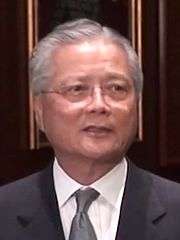 | Wholesale and Retail | 1 December 2014 | 7 October 2016 |
| 3 | Felix Chung (born 1963) | 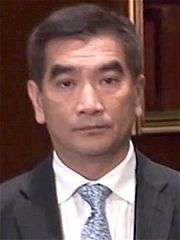 | Textiles and Garment | 7 October 2016 | Incumbent |
Chairpersons
| № | Leader (Birth–Death) |
Portrait | Constituency | Took Office | Left Office |
|---|---|---|---|---|---|
| 1 | Allen Lee (born 1940) | 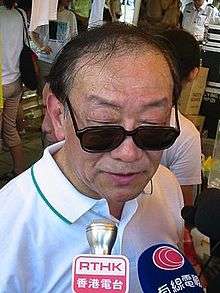 | Appointed (1993–95) New Territories North-east (1995–97) | 26 June 1993 | 5 December 1998 |
| 2 | James Tien (born 1947) |  | Commercial (First) (1998–2004) New Territories East (2004–08) | 5 December 1998 | 8 September 2008[n 1] |
| 3 | Miriam Lau (born 1947) |  | Transport | 8 September 2008[n 1] | 9 September 2012 |
| – | Vincent Fang (born 1943) Acting |  | Wholesale and Retail | 9 September 2012 | 15 December 2012 |
| 4 | Selina Chow (born 1945) | 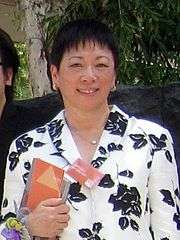 | None | 15 December 2012 | 1 December 2014 |
| 5 | Felix Chung (born 1963) |  | Textiles and Garment | 1 December 2014 | 7 October 2016 |
| 6 | Tommy Cheung (born 1949) | 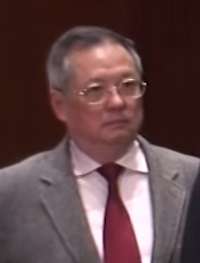 | Catering | 7 October 2016 | Incumbent |
- 1 2 Resigned, Miriam Lau served as acting chair between 8 September and 24 October 2008.
Honorary chairpersons
- James Tien, 2010–2012, 2014–present
- Miriam Lau, 2012–present
- Selina Chow, 2014–present
- Vincent Fang, 2016–present
Vice-chairpersons
- Ronald Arculli, 1993–2000
- Steven Poon, 1996–1998
- Selina Chow, 1998–2008, 2011–2012
- Miriam Lau, 2000–2008
- Tommy Cheung, 2008–2010
- Vincent Fang, 2008–2014
- Felix Chung, 2012–2014
- Peter Shiu, 2014–present
- Alan Hoo, 2016–present
- Lee Chun-keung, 2016–present
See also
References
- ↑ "After Occupy, Liberal Party head seeks middle ground in divided Hong Kong". South China Morning Post. 22 December 2014.
- 1 2 Horlemann, Ralf (2013). Hong Kong's Transition to Chinese Rule: The Limits of Autonomy. Routledge. p. 48.
- 1 2 JPRS Report: China, Issues 21–30. Foreign Broadcast Information Service. 1993. p. 41.
- 1 2 "Turnout doubles for gay pride march". South China Morning Post. 10 November 2013.
- ↑ "定位中間偏右 圖擺脫大財團影子 自由黨開班惡補政治". Apple Daily. 31 December 2008.
- 1 2 3 Chung, Sze Yuen, ed. (2001). Hong Kong's Journey to Reunification: Memoirs of Sze-yuen Chung. Chinese University Press. p. 191.
- ↑ Ku, Agnes S. M. (1999). Narratives, Politics, and the Public Sphere: Struggles Over Political Reform in the Final Transitional Years in Hong Kong (1992–1994). Ashgate Publishing Company. p. 106.
- ↑ 九七過渡: 香港的挑戰. Chinese University Press. 1997. p. 63.
- ↑ "1994年 大事紀要". Liberal Party. Archived from the original on 2 November 2004.
- ↑ "1998年 大事紀要". Liberal Party. Archived from the original on 2 November 2004.
- ↑ "1999年 大事紀要". Liberal Party. Archived from the original on 2 November 2004.
- ↑ Lo, Sonny Shiu-hing (2008). The Dynamics of Beijing-Hong Kong Relations: A Model for Taiwan?. Hong Kong University Press. p. 223.
- ↑ Liu, Zhaojia; Lau, Siu-kai (2002). The First Tung Chee-hwa Administration: The First Five Years of the Hong Kong Special Administrative Region. Chinese University Press. p. 29.
- ↑ "2003年 大事紀要". Liberal Party. Archived from the original on 2 November 2004.
- ↑ Cheng, Joseph Yü-shuo; Zheng, Yushuo, eds. (2013). Has He Got the Job Done?: An Evaluation of Donald Tsang's Administration. City University of HK Press. p. 73.
- ↑ Kwong, Bruce Kam (2009). Patron-Client Politics and Elections in Hong Kong. Routledge. p. 76.
- 1 2 Gary Cheung, Ambrose Leung & Fanny Fung, "Liberals doomed, says founding chief", 11 September 2008, Page A1, South China Morning Post
- ↑ Ambrose Leung & Fanny Fung, "Heung Yee Kuk chairman quits Liberal Party", 12 September 2008, Page A2, South China Morning Post
- ↑ Bonnie Chen, "Chaos as Liberal trio revolts", 9 October 2008 The Standard
- ↑ Cagape, Elmer W. (25 March 2010). "Lawmaker apologizes for HK$20 hourly wage plan". Asian Correspondent.
- ↑ "Tommy Cheung is liability". Ming Pao. 25 March 2010.
- ↑ Leung, Ambrose (20 November 2010). "Michael Tien splits from Liberals, citing principles". South China Morning Post.
- ↑ Leung, Ambrose; Fun, Fanny W. Y. (17 December 2010). "James Tien and Chow leading Liberals again". South China Morning Post.
- ↑ "自由黨正、副主席的選舉結果公佈 (2011年1月6日)". Liberal Party. 6 January 2011.
- ↑ Siu, Phila (22 March 2012). "Tang or Blank". The Standard.
- ↑ "CY the worst chief executive yet, storms Tien". The Standard. 26 August 2013.
- ↑ "Liberals press for TV license answers". The Standard. 28 October 2013.
- ↑ Liberal Party picks acting chairman, SCMP, City Digest, 18 September 2012
- ↑ Chow new chairperson of Liberal Party, RTHK News, 15 Dec 2012, Accessed 15 Dec 2012
- ↑ James Tien faces CPPCC expulsion, RTHK, 28 October 2014
- ↑ "Politician Who Called for Hong Kong Leader's Resignation Is Formally Penalized". New York Times. 29 October 2014. Retrieved 31 October 2014.
- ↑ Lam, Jeffie; Ng, Joyce (26 August 2016). "Election bombshell: threats and attempted bribery alleged as Hong Kong's New Territories West Legco candidate drops out of poll race". South China Morning Post.
- ↑ "是否繼續「ABC」反梁 自由黨鬧分歧". HK01. 7 October 2016.
- ↑ "Hong Kong leader appoints two new cabinet members just four months from leadership race". South China Morning Post. 25 November 2016.
External links
- Liberal Party official site (Click 'English' in the top right-hand corner for the English version)
- Liberal Party on Facebook